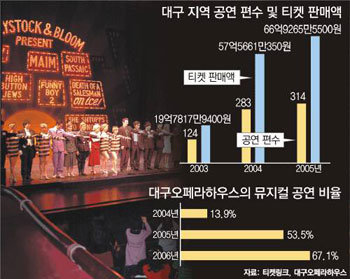Daegu

The musical The Producers sold out eight times in Daegu through advanced ticket purchases alone. Up until then, the shows paid admissions were about 65 percent of audience capacity. Seoland Company, a production company, expects that the shows Seoul run will peak above 70 percent.
The musical visited Daejeon before reaching Daegu, where it ran at less than 50 percent of theater capacity.
Seoul Do-yoon, the head of the company said, Busan is the second largest city in terms of population, but when it comes to the musical market size, Busan is only about two-thirds that of Daegu. Daegu is the only city where a long-term performance of over a month is possible.
I Love You, a popular musical that was staged in eight cities including Daegu and Busan, recorded 85 percent seat occupancy in its eight cities except for Daegu, where it recorded a whopping 95 percent.
According to TicketLink, the number of performances in Daegu rose from 124 in 2003 to 315 in 2005. Ticket sales more than tripled from 1.97 billion won in 2003 to 6.69 billion won in 2005. Yoo Gyeong-suk, director of the marketing department, said, The ticket sales increased relatively more than the number of performances, because large-scale performances with expensive tickets increased.
For example, the opera house in Daegu saw its share of musicals surge to 67.1 percent this year from 13.9 percent in 2004.
The musical boom was sparked by the success of Mamma Mia last year. At that time, musicals usually were staged for about 10 days at best, but Mamma Mia was so successful that it lasted over two months. Mamma Mia in Daegu attracted 64,000 audience members, ranking Daegu as the fifth city in ticket sales. Daegu is the only provincial city to set that kind of record.
Mamma Mia in Daegu attracted people from other cities such as Gumi and Ulsan. They accounted for as much as 45 percent of the entire audience. Jekyll and Hyde, which ended recently, drew 100 members from a group of musical lovers in Busan, suggesting that Daegu is emerging as a cultural hub.
The strengths of Daegu as such a hub include a sound infrastructure and a solid audience base. In Daegu, there are as many as six performance halls with more than 1,500 seats including a large hall with 1,300 seats that will open in September. A producer of performances in Daegu said, Since there are many wealthy people in Daegu, the audience base who can afford to buy expensive tickets is stronger than other cities.
As a marketing strategy, large companies buy group viewing tickets for VIP customers not only in Seoul but also in Daegu. When Producers was performed, five large companies bought tickets for VIP customers in both Seoul and Daegu.
Transportation infrastructure is also very important. Following KTX opening, a highway between Daegu and Busan was opened. Daegu is only a 45 minute drive away from Busan, making Daegu more accessible to Busan citizens.
Daegu paid attention to the fact that labor costs account for more than 60 percent of the total production costs and the performance industry is good for job creation and have decided to host a Daegu Musical Festival every January starting next year. It aims to develop the festival into one similar to PIFF (Pusan International Film Festival) in order to foster Daegu as Asias musical hub.
Kim Dae-kwon from the culture and industry department of Daegu city said, We will secure land of 35,000 pyeong and establish three musicals-only halls, institutions for training professionals in the musical industry and stage setting production facilities. By 2012, we will build an advanced performance complex that will center on musicals.
Officials in the performance-related industry said, Unless there is no other market besides Seoul, it will be difficult to cover the soaring musical production costs, showing their high expectations for the musical hub of Daegu.
Sue-Jean Kang sjkang@donga.com






![연금 개시 가능해지면 年 1만 원은 꼭 인출하세요[은퇴 레시피]](https://dimg.donga.com/c/138/175/90/1/wps/NEWS/IMAGE/2026/02/20/133390850.4.jpg)
